人教版九年级全一册英语Unit6重点语法知识点总结
人教版九年级英语Unit6知识点总结
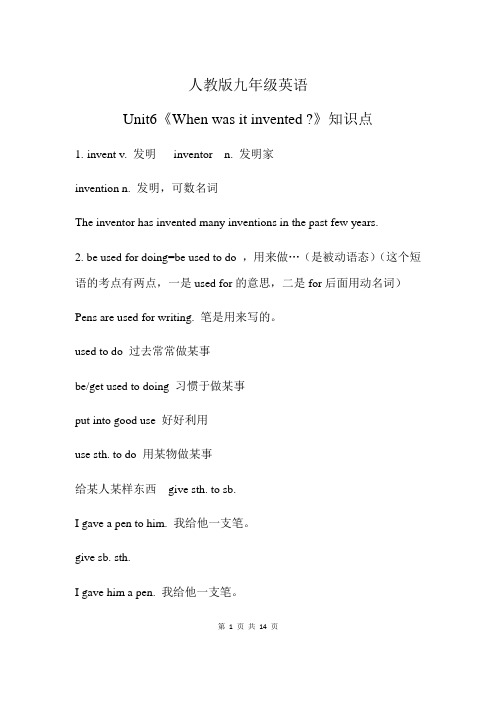
人教版九年级英语Unit6《When was it invented ?》知识点1.invent v. 发明inventor n. 发明家invention n. 发明,可数名词The inventor has invented many inventions in the past few years.2. be used for doing=be used to do ,用来做…(是被动语态)(这个短语的考点有两点,一是used for的意思,二是for后面用动名词)Pens are used for writing. 笔是用来写的。
used to do 过去常常做某事be/get used to doing 习惯于做某事put into good use 好好利用use sth. to do 用某物做某事给某人某样东西give sth. to sb.I gave a pen to him. 我给他一支笔。
give sb. sth.I gave him a pen. 我给他一支笔。
第 1 页共14 页pass/offer /send/show/write/bring/sell/lend/serve/ tobuy/cook/make/get/sing/prepare for4. all day 整天all evening/night the whole day5. salty adj. 咸的salt n. 盐sour/sweet/bitter/hot/salty酸甜苦辣咸6. by mistake 错误地(犯错是:make mistakes=make a mistake,这些常见的短语大家务必要掌握)I took the umbrella by mistake. 我不小心拿错了雨伞。
7. by accident/chance 意外,偶然(常见短语,考的最多的是它的意思)I met her by accident at bus stop.我在公共汽车站意外地见到了她。
人教版英语九年级全册单元unit 6 知识点+测试卷+思维导图
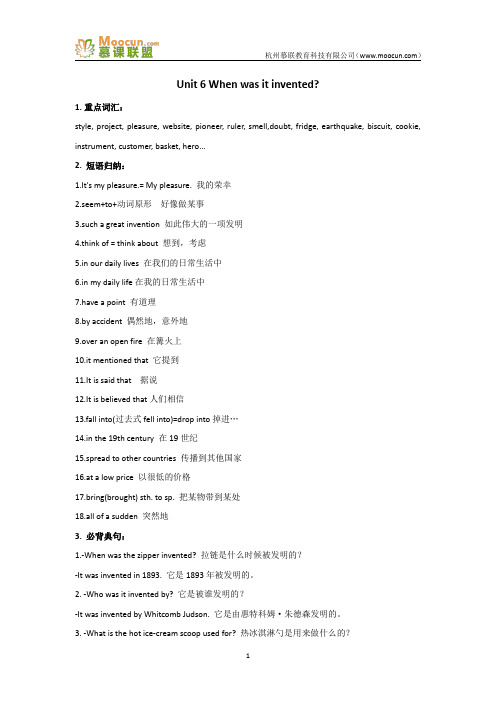
Unit 6 When was it invented?1.重点词汇:style, project, pleasure, website, pioneer, ruler, smell,doubt, fridge, earthquake, biscuit, cookie, instrument, customer, basket, hero...2. 短语归纳:1.It's my pleasure.= My pleasure. 我的荣幸2.seem+to+动词原形好像做某事3.such a great invention 如此伟大的一项发明4.think of = think about 想到,考虑5.in our daily lives 在我们的日常生活中6.in my daily life在我的日常生活中7.have a point 有道理8.by accident 偶然地,意外地9.over an open fire 在篝火上10.it mentioned that 它提到11.It is said that 据说12.It is believed that人们相信13.fall into(过去式fell into)=drop into掉进…14.in the 19th century 在19世纪15.spread to other countries 传播到其他国家16.at a low price 以很低的价格17.bring(brought) sth. to sp. 把某物带到某处18.all of a sudden 突然地3. 必背典句:1.-When was the zipper invented? 拉链是什么时候被发明的?-It was invented in 1893. 它是1893年被发明的。
2. -Who was it invented by? 它是被谁发明的?-It was invented by Whitcomb Judson. 它是由惠特科姆·朱德森发明的。
人教版九年级英语全一册知识梳理第六单元《Unit 6 Section A》
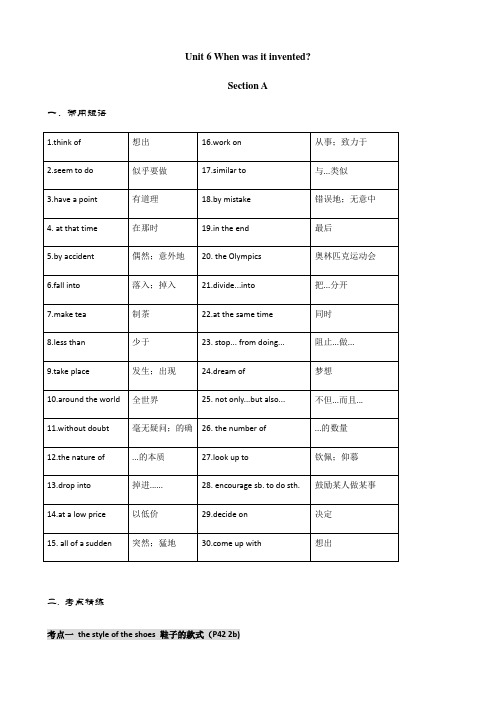
Unit 6 When was it invented?Section A一.常用短语二.考点精练考点一the style of the shoes 鞋子的款式(P42 2b)(1)style词性_________,意为__________。
常用短语in style意为“时髦的”,其反义短语为_____________,意为“过时的”。
名词/“样式;款式”/out of style☑ This year's style in dresses is different from last year's.今年的裙子样式与去年的不同。
☑ Her clothes are always in style.她的衣服总是很时髦。
(2)style 做名词,还可意为___________。
“方式”☑ Our children need new learning styles.我们的孩子需要新的学习方式。
考点二With pleasure! 非常愿意!(P42 2d)pleasure词性_________,意为___________。
名词/“高兴;愉快”☑ Watching the 2016 Summer Olympics gave him great pleasure.观看2016年夏季奥运会给他以极大的愉悦。
【辨析】with pleasure与my pleasure☑-Could you help me with my English?你能帮我学习英语吗?-With pleasure.当然可以。
☑ Thanks for helping me.谢谢你帮助了我。
-My pleasure./It's a pleasure.别客气。
考点三Think about how often it's used in our daily lives. 想想看,在我们的日常生活中它被使用得多么频繁。
(P42 2d)daily此处词性为_________,意为___________。
九年级英语全一册同步必背知识清单 Unit 6 (人教版)
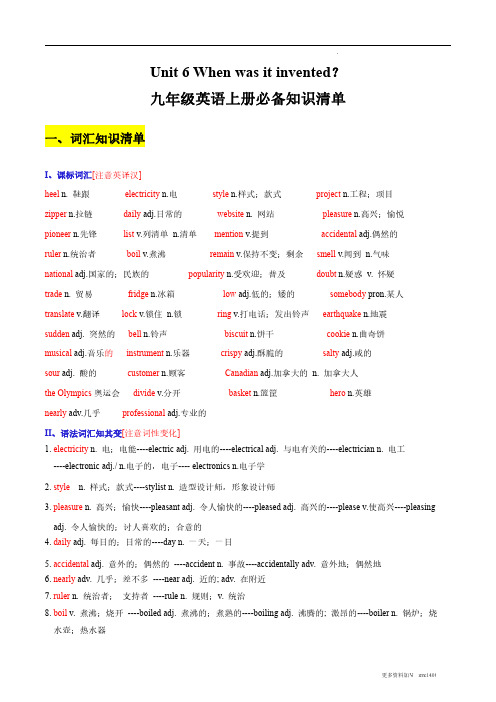
Unit6When was it invented?九年级英语上册必备知识清单一、词汇知识清单I、课标词汇[注意英译汉]heel n.鞋跟electricity n.电style n.样式;款式project n.工程;项目zipper n.拉链daily adj.日常的website n.网站pleasure n.高兴;愉悦pioneer n.先锋list v.列清单n.清单mention v.提到accidental adj.偶然的ruler n.统治者boil v.煮沸remain v.保持不变;剩余smell v.闻到n.气味national adj.国家的;民族的popularity n.受欢迎;普及doubt n.疑惑v.怀疑trade n.贸易fridge n.冰箱low adj.低的;矮的somebody pron.某人translate v.翻译lock v.锁住n.锁ring v.打电话;发出铃声earthquake n.地震sudden adj.突然的bell n.铃声biscuit n.饼干cookie n.曲奇饼musical adj.音乐的instrument n.乐器crispy adj.酥脆的salty adj.咸的sour adj.酸的customer n.顾客Canadian adj.加拿大的n.加拿大人the Olympics奥运会divide v.分开basket n.篮筐hero n.英雄nearly adv.几乎professional adj.专业的II、语法词汇知其变[注意词性变化]1.electricity n.电;电能----electric adj.用电的----electrical adj.与电有关的----electrician n.电工----electronic adj./n.电子的,电子----electronics n.电子学2.style n.样式;款式----stylist n.造型设计师,形象设计师3.pleasure n.高兴;愉快----pleasant adj.令人愉快的----pleased adj.高兴的----please v.使高兴----pleasingadj.令人愉快的;讨人喜欢的;合意的4.daily adj.每日的;日常的----day n.一天;一日5.accidental adj.意外的;偶然的----accident n.事故----accidentally adv.意外地;偶然地6.nearly adv.几乎;差不多----near adj.近的;adv.在附近7.ruler n.统治者;支持者----rule n.规则;v.统治8.boil v.煮沸;烧开----boiled adj.煮沸的;煮熟的----boiling adj.沸腾的;激昂的----boiler n.锅炉;烧水壶;热水器9.remain v.保持不变;剩余----remaining adj.剩下的;剩余的10.smell n.气味v.发出……气味;闻到----smelly adj.有臭味的;发臭的11.national adj.国家的;民族的----nation n.国家;民族----international adj.国际的---nationality n.国家,国籍;民族12.doubt n.疑惑;疑问v.怀疑----doubtful adj.可疑的;令人生疑的----doubtless=----undoubted adj.无疑的;确定的----doubtlessly=---undoubtedly无疑地;确实地13.low低的;矮的----lower adj.下方的;在底部的14.translate v.翻译----translation n.翻译----translator n.翻译家15.lock v.锁上;锁住n.锁---locker n.可锁存物柜;存放室;存放柜;锁具---unlock v.开启16.sudden adj.突然(的)----suddenly adv.突然地17.musical adj.音乐的;有音乐天赋的----music n.音乐----musician n.音乐家18.salty adj.咸的----salt n.盐----saltless adj.无盐的;无味的19.sour adj.酸的;有酸味的----sourish adj.微酸的20.Canadian adj.加拿大的;加拿大人的n.加拿大人----Canada n.加拿大21.popularity n.受欢迎;普及----popular adj.普遍的;流行的----unpopular adj.不流行的----popularly adv.流行地,通俗地;普及地,广泛地22.hero n.英雄;男主角----heroine n.女英雄----heroic adj.英雄的;英勇的23.professional adj.职业的;专业的----profession n.职业;专业----professor n.教授;教师III、重点短语知搭配[注意固定短语的英汉互译]1、be invented in+地点/时间被发明于某时某地be invented by sb由某人发明的2、shoes with adjustable heels可调后跟的鞋3、change the style of sth改变……的风格4、see in the dark在黑暗中看路5、run on electricity电动的6、operate on sb给某人动手术7、think of想出,想到8、with pleasure乐意效劳9、such+(a/an)+形容词+名词如此……10、think about(doing)sth.考虑(做)某事11、be used for(doing)sth被用来做某事be used by sb.被谁使用be used as被当作……使用be used to do sth被用来做某事be/get used to(doing)sth.习惯做某事used to do sth过去常做某事12、by accident=by chance意外地,偶然地13、by mistake错误地make mistakes in sth在某事上犯错mistake A for B错把……当成……14、in the end=finally=at last最后,终于at the end of…在……末,尽头by the end of在……末之前end up with以……结束end up doing sth结束做某事15、形容词/副词+enough足够的……enough+名词足够的……16、seem to do sth似乎要做某事seem like+名词似乎象…seem that从句似乎……17、for a long time好长时间18、sprinkle A on B把……撒在……上19、not...until...直到……才20、at that time在那时21、over=more than多于22、according to根据23、It’s said that从句据说……24、some time一些时间sometime某时(将来)sometimes有时some times几次25、boil drinking water烧开水26、over an open fire在户外篝火上in the open air在户外27、fall into落入fall off从……掉下来fall down跌倒fall over摔倒fall in love with爱上28、make tea沏茶29、It’s believed that从句人们认为……30、decide to do决定作某事31、not...until...直到……才……32、in this/that way这/那样33、take place(意料之中)发生34、the popularity of...……的普及35、without doubt毫无疑问36、throw sth away把……扔掉throw sth to sb把某物扔给某人37、in the1950s在二十世纪五十年代38、prefer….to…..更喜欢39、at a low price以低价40、steal...from...从……偷……41、translate...into...把……翻译成……42、notice sb do/doing注意某人做过/正在做43、all of a sudden突然,猛地44、make sb./sth.+形容词使……怎么样45、change...into...把……变成……46、in history在历史上47、play indoors在室内玩48、stop...from...阻止……做某事49、on the same team在同一个对50、the safety of...……的安全51、knock into sb撞到某人knock at/on the door敲门52、divide…into…把……划分成53、the aim of………的目的54、try to do sth尽力做某事try doing sth.尝试做某事55、get...into...把……弄进……56、dream of/about梦想做某事57、not only...but also...不但……而且……(并列主语时,谓语的数由最近主语决定)58、the number of...……的数量(做主语时,谓语用单数)a number of许多……(做主语时,谓语用复数)59、look up to钦佩,羡慕60、encourage sb to do sth鼓励某人做某事IV、核心单词知用法[注意固定短语、句型和词块]1.style n.样式;款式【短语】out of style过时的in style流行的2.pleasure n.高兴;愉悦的【拓展】pleasant adj.令人愉快的,修饰事物pleased adj.感到高兴的,修饰人With pleasure.乐意效劳是对方提出请求,答应对方的用语,问句通常是“Could you please do....?”My pleasure.不用谢常用作别道谢时的客气回答。
Unit6知识点归纳(短语+句型+语法) 人教版九年级英语全册

人教版九年级U6知识点归纳(短语+句型+语法)Unit 6 When was it invented?【重点短语】1. by accident 偶然地;意外地2. without doubt 毫无疑问的;的确3. by mistake 错误地;无意中4. look up to 钦佩;仰慕5. take place 发生;出现6. all of a sudden 突然;猛地7. divide…into… 把……分开8. the Olympics 奥林匹克运动会9. the style of ……的样式10. be used for 被用于……11. give sth. to sb./ give sb. sth. 给某人某样东西12. be used for doing ,用来做…...14. all day 整天15. by mistake 错误地16. make mistake犯错17. by accident 意外,偶然19. not…until… 直到……才……20. fall into 落入,掉进21. fall down 摔倒22. in the way 这样23. travel around 周游24. knock into 撞上. 某人)25. divide sth. into … ,将…划分成,【重点句型】1.Who was it invented by? It was invented by Bell.2. What is the hot ice-cream scoopused for? It s used for serving really cold ice-cream.3. English is spoken by many people.4. I gave a pen to him.= I gave him a pen. 我给了他一支笔。
5. It made me happy. 它使我高兴6. I didn’t go to bed until I finished my work. 我直到完成我的工作才去睡觉。
人教版英语九年级Unit 6知识点总结
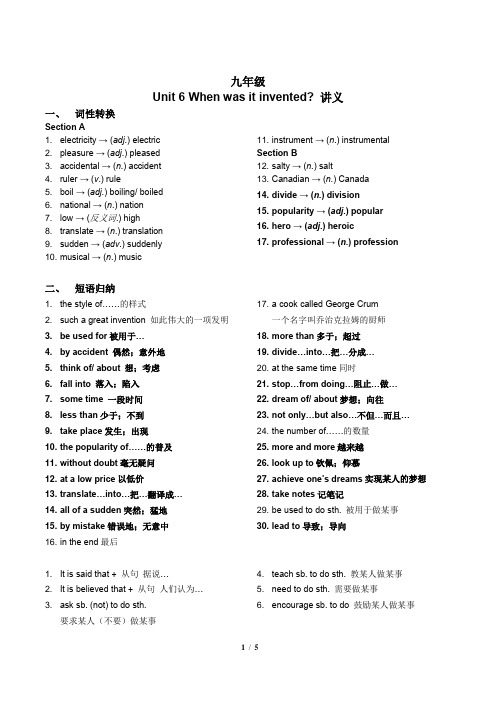
九年级Unit 6 When was it invented? 讲义一、词性转换Section A1. electricity → (adj.) electric2. pleasure → (adj.) pleased3. accidental → (n.) accident4. ruler → (v.) rule5. boil → (adj.) boiling/ boiled6. national → (n.) nation7. low → (反义词.) high8. translate → (n.) translation9. sudden → (adv.) suddenly10. musical → (n.) music 11. instrument → (n.) instrumental Section B12. salty → (n.) salt13. Canadian → (n.) Canada14. divide → (n.) division15. popularity → (adj.) popular16. hero → (adj.) heroic17. professional → (n.) profession二、短语归纳1. the style of……的样式2. such a great invention 如此伟大的一项发明3. be used for被用于…4. by accident 偶然;意外地5. think of/ about 想;考虑6. fall into 落入;陷入7. some time 一段时间8. less than少于;不到9. take place发生;出现10. the popularity of……的普及11. without doubt毫无疑问12. at a low price以低价13. translate…into…把…翻译成…14. all of a sudden突然;猛地15. by mistake错误地;无意中16. in the end最后17. a cook called George Crum一个名字叫乔治克拉姆的厨师18. more than多于;超过19. divide…into…把…分成…20. at the same time同时21. stop…from doing…阻止…做…22. dream of/ about梦想;向往23. not only…but also…不但…而且…24. the number of……的数量25. more and more越来越26. look up to钦佩;仰慕27. achieve one’s dreams实现某人的梦想28. take notes记笔记29. be used to do sth. 被用于做某事30. lead to导致;导向1. It is said that + 从句据说…2. It is believed that + 从句人们认为…3. ask sb. (not) to do sth.要求某人(不要)做某事4. teach sb. to do sth. 教某人做某事5. need to do sth. 需要做某事6. encourage sb. to do 鼓励某人做某事三、重点句子1. the style of the shoes 鞋的样式★style短语:in style 流行的;时髦的out of style 过时的a life style生活方式2. --- Can you help me think of an invention? 你能帮我想个发明吗?★★--- My pleasure! 乐意效劳!3. Is it really such a great invention? 它真的是这么伟大的一项发明吗? ★★4. Think about how often it’s used in our daily lives. 想想在我们的日常生活中它多久被用一次。
人教版九年级英语unit6知识点总结
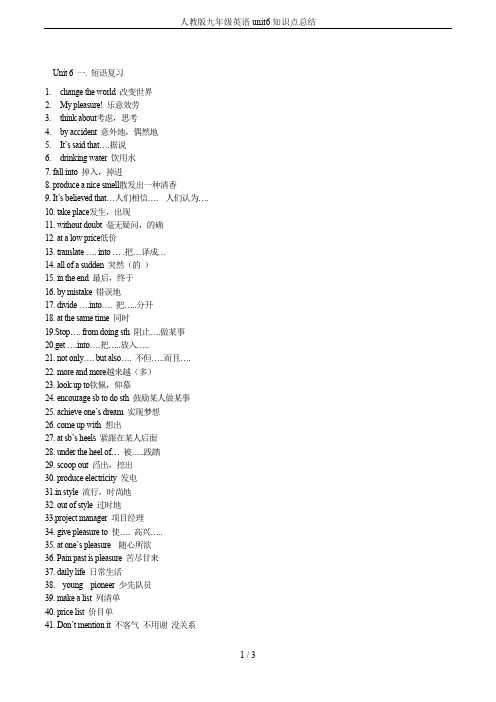
Unit 6 一. 短语复习1.change the world 改变世界2.My pleasure! 乐意效劳3.think about考虑,思考4.by accident 意外地,偶然地5.It’s said that….据说6.drinking water 饮用水7. fall into 掉入,掉进8. produce a nice smell散发出一种清香9. It’s believed that…人们相信…. 人们认为….10. take place发生,出现11. without doubt 毫无疑问,的确12. at a low price低价13. translate …. into … .把…译成…14. all of a sudden 突然(的)15. in the end 最后,终于16. by mistake 错误地17. divide ….into…. 把…..分开18. at the same time 同时19.Stop…. from doing sth 阻止….做某事20.get ….into….把…..放入…..21. not only…. but also…. 不但…..而且….22. more and more越来越(多)23. look up to钦佩,仰慕24. encourage sb to do sth 鼓励某人做某事25. achieve one’s dream 实现梦想26. come up with 想出27. at sb’s heels 紧跟在某人后面28. under the heel of… 被…..践踏29. scoop out 舀出,挖出30. produce electricity 发电31.in style 流行,时尚地32. out of style 过时地33.project manager 项目经理34. give pleasure to 使…. 高兴…..35. at one’s pleasure 随心所欲36. Pain past is pleasure 苦尽甘来37. daily life 日常生活38. young pioneer 少先队员39. make a list 列清单40. price list 价目单41. Don’t mention it 不客气不用谢没关系42.boil up 煮沸烧开43.remain calm 保持冷静44. sense of smell 嗅觉45. in doubt 可疑的不能肯定的46. sudden death 猝死47. spread to other countries 传播到其他国家48. a Chinese ruler 一位中国统治者49. over an open fire 在一堆明火上50. make tea 沏茶51. the national drink 国民饮料52. the popularity of tea 茶叶的普及53. go out alone 单独外出54. work on the invention of the telephone = invent the telephone 发明电话55.attract customers 吸引顾客56. Don’t put all your eggs in one basket 不要孤注一掷57. folk hero 民间英雄58. a much-loved and active sport 一项深受喜爱和活跃的运动59.in history 在历史上60. work together 合作61. lead to 把… 带到…. 导致62. more than 多于超出63.the personal computer 私人电脑64. take an active part in 积极参加二。
人教版九年级英语(全册)重点语法知识点复习梳理

人教版九年级英语(全册)重点语法知识点复习梳理人教版九年级英语重点语法知识点复习梳理一.介词by的用法(Unit-1重点语法)1.意为“在……旁”,“靠近”。
Some are singing and dancing under a big tree. Some are drawing by the lake.有的在大树下唱歌跳舞。
有的在湖边画画儿。
2.意为“不迟于”,“到……时为止”。
Your son will be all right by supper time.你的儿子在晚饭前会好的。
How many English songs had you learned by the end of last term?到上个学期末你们已经学了多少首英语歌曲?3.表示方法、手段,可译作“靠”、“用”、“凭借”、“通过”、“乘坐”等。
The monkey was hanging from the tree by his tail and laughing.猴子用尾巴吊在树上哈哈大笑。
The boy’s father was so thankful that he taug ht Edison how to send messages byrailway telegraph.孩子的父亲是那末的感谢,因而他教爱迪生怎样经由过程铁路电报来转达息。
4.透露表现“逐个”,“逐批”的意思。
One by one they went past the table in the dark.他们一个一个得在黑暗中颠末这张桌子。
5.表示“根据”,“按照”的意思。
What time is it by your watch?你的表几点了?6.和take , hold等动词连用,说明接触身体的某一部分。
I took him by the hand.我拉住了他的手。
7.用于被动句中,表示行为主体,常译作“被”、“由”等。
English is spoken by many people.英语被许多人说。
人教版九年级英语全册Unit6知识点
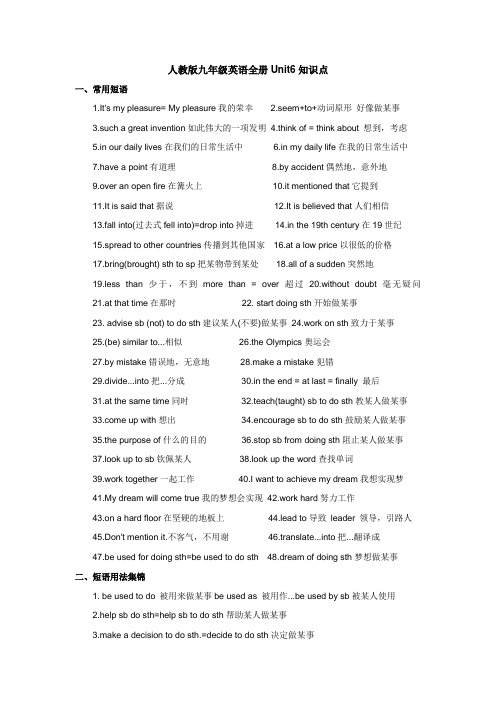
人教版九年级英语全册Unit6知识点一、常用短语1.It's my pleasure= My pleasure我的荣幸2.seem+to+动词原形好像做某事3.such a great invention如此伟大的一项发明4.think of = think about 想到,考虑5.in our daily lives在我们的日常生活中6.in my daily life在我的日常生活中7.have a point有道理8.by accident偶然地,意外地9.over an open fire在篝火上10.it mentioned that它提到11.It is said that据说12.It is believed that人们相信13.fall into(过去式fell into)=drop into掉进14.in the 19th century在19世纪15.spread to other countries传播到其他国家16.at a low price以很低的价格17.bring(brought) sth to sp把某物带到某处18.all of a sudden突然地19.less than少于,不到more than = over 超过20.without doubt毫无疑问21.at that time在那时22. start doing sth开始做某事23. advise sb (not) to do sth建议某人(不要)做某事24.work on sth致力于某事25.(be) similar to...相似26.the Olympics奥运会27.by mistake错误地,无意地28.make a mistake犯错29.divide...into把...分成30.in the end = at last = finally 最后31.at the same time同时32.teach(taught) sb to do sth教某人做某事e up with想出34.encourage sb to do sth鼓励某人做某事35.the purpose of什么的目的36.stop sb from doing sth阻止某人做某事37.look up to sb钦佩某人38.look up the word查找单词39.work together一起工作40.I want to achieve my dream我想实现梦41.My dream will come true我的梦想会实现42.work hard努力工作43.on a hard floor在坚硬的地板上44.lead to导致leader 领导,引路人45.Don't mention it.不客气,不用谢46.translate...into把...翻译成47.be used for doing sth=be used to do sth 48.dream of doing sth梦想做某事二、短语用法集锦1. be used to do 被用来做某事be used as 被用作...be used by sb被某人使用2.help sb do sth=help sb to do sth帮助某人做某事3.make a decision to do sth.=decide to do sth决定做某事4.make sb + adj使某人怎么样make sb do sth使某人做某事be made to do sth被使唤去做某5..in this way这样,用这种方式三、重点语法1.some time 一段时间sometimes 有时some times几次sometime 某个时候2.one of the world's favorite drinks世界最受欢迎的饮料之一.one of 什么之一,后面的名词用复数(一般要加S),动词用单数(一般要加S);favorite,最喜欢的,前面要用“谁的”.3.thousand千hundred百million百万,当它们前面有数字的时候,它们本身不能加S,当它们后面有of的时候它们要加S,但前面的数字和后面的of不能同时存在4.not…until直到…才,I don‘t go to sleep until 11 every day.我每天直到11点才睡觉。
人教版九年级英语全一册知识点Unit6知识点总结

Unit 6 When was it invented? 重点知识归纳解析【重点单词】1. project n. 项目,工程;2. pleasure n. 高兴,愉快;3. daily adj. 日常的,每日的;4. mention v. 提到,说到;5. nearly adv.几乎,差不多;6. boil v. 煮沸,烧开;7. remain v. 保持不变;剩余;8. national adj.国家的,民族的;9. low adj.低的,矮的;10. translate v.翻译;11. lock v.锁上;n. 锁;12. sudden adj. 突然的13. crispy adj. 脆的;酥脆的;14. salty adj.咸的;15. sour adj.酸的,有酸味的;16. customer n.顾客。
17. Canadian 加拿大的,18. divide v.分开,分散;19. hero n英雄,男主角;20. professional adj. 职业的,专业的;【重点词组】1. shoes with special heels 特殊后跟的鞋子2. hot ice cream scoop 热的冰其淋勺子3. run on electricity 电动的4. be used for 被用作5. the subject for my school project 学校项目的课题6. our daily lives 我们的日常生活7. have a point 有点道理8. by accident 偶然,意外地9. over the open fire 在火堆上10. fall into the water 落入水中11. take place 发生12. without doubt 毫无疑问13. at a low price 以一个很低的价格14. translate the book into different language 把书翻译成不同种的语言15. all of sudden 突然16. by mistake 错误地17. a much-loved and active sport 一个深受喜爱并且积极的运动18. divide…into 把…分开19. stop sb from doing sth 阻止某人做某事20. look up to 钦佩,仰慕21. the professional basketball groups 职业篮球机构22. use someone else’s idea 借用其他人的想法【重点句式】1. I think the TV was invented before the car. 我认为电视是在轿车之前发明的。
九年级英语全册Unit6单元语法专题SectionAGrammarFocus_4c人教版
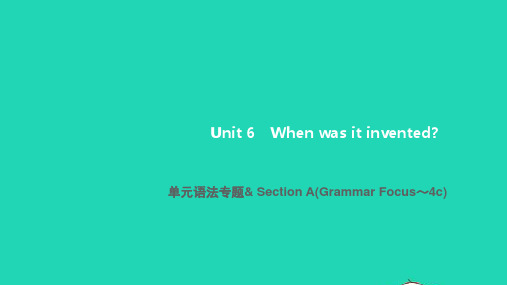
Monday.
A. accepts B. accepted C. was accepted D. is accepted
(C )2. (2018·重庆)—Who's the little girl in the photo, Laura?
—It's me. This photo______when I was five.
Unit 6 When was it invented?
单元语法专题& Section A(Grammar Focus~4c)
语法知识专讲
被动语态(二) 一、一般过去时的被动语态 在第五单元已介绍了被动语态的概念及主动语态变被动语态的用法,本单 元主要介绍一般过去时的被动语态。一般过去时的被动语态的结构: 1. 肯定句:主语+was/were+Vp. p(+by…).
A. is taken B. takes
C. was taken
D. took
C( )3. (2019·百色改编)As we know,printing ______ during the Sui and Tang
Dynasties in China.
A. invented
B. is invented
e. g. :—Was he invited to the party?他被邀请去参加晚会了吗? —Yes, he was. 是的。
4. 特殊疑问句:特殊疑问词(When/Where/Who/…)+was/were+主语+Vp. p(+ by…)?
e. g. :Where was the car parked?那辆车停在什么地方?
by ordinary people by accident.
人教版九年级英语unit6知识点总结
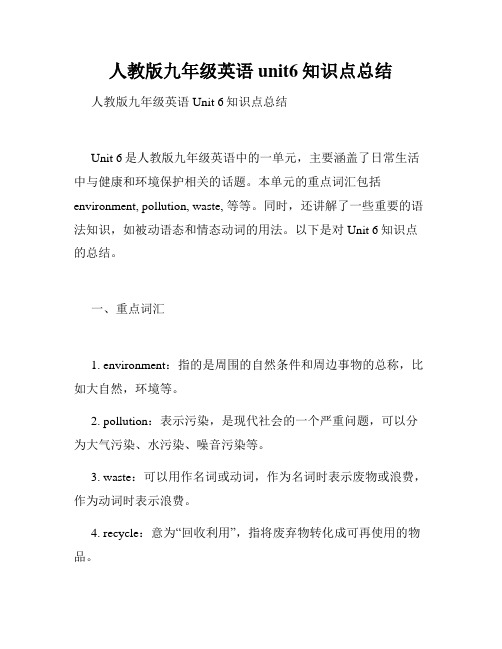
人教版九年级英语unit6知识点总结人教版九年级英语Unit 6知识点总结Unit 6是人教版九年级英语中的一单元,主要涵盖了日常生活中与健康和环境保护相关的话题。
本单元的重点词汇包括environment, pollution, waste, 等等。
同时,还讲解了一些重要的语法知识,如被动语态和情态动词的用法。
以下是对Unit 6知识点的总结。
一、重点词汇1. environment:指的是周围的自然条件和周边事物的总称,比如大自然,环境等。
2. pollution:表示污染,是现代社会的一个严重问题,可以分为大气污染、水污染、噪音污染等。
3. waste:可以用作名词或动词,作为名词时表示废物或浪费,作为动词时表示浪费。
4. recycle:意为“回收利用”,指将废弃物转化成可再使用的物品。
5. protect:表示保护,指采取措施,预防破坏或危害。
6. global:意为“全球的”,用来描述事情或现象具有全球性的范围和影响。
7. vehicle:表示车辆,可用来指代各种交通工具,如汽车、火车等。
二、重要句型和语法知识1. 被动语态(Passive Voice)被动语态是英语中重要的语法结构之一,使用形式为“助动词be + 及物动词的过去分词”。
例如:- The book was written by him.(这本书是他写的。
)被动语态常用于以下情况:- 强调动作的接受者(宾语)而不是执行动作的人(主语)。
- 主语未知或不重要。
- 特定情境下。
2. 情态动词(Modal Verbs)情态动词用来表示情态、可能性、建议、允许等。
常见的情态动词有can, could, may, might, should, must, ought to等。
例如:- You should recycle the plastic bottles.(你应该回收塑料瓶。
)3. 祈使句(Imperatives)祈使句是用来发出命令、请求、建议等的句子。
人教版九年级英语全一册知识梳理第六单元《Unit 6 Grammar》

Unit 6 When was it invented?Grammar Focus一般过去时的被动语态1.一般过去时的被动语态的句式结构2.一般过去时的被动语态的基本用法(1)表示过去某一具体时间发生的动作,且句子的主语是谓语动词动作的承受者。
☑ The house was built in 1990.这所房子建于1990年。
(2)讲述发生在过去的动作,且不知道动作的执行者。
☑ He was honored with the name “Father of Hybrid Rice”。
他被授予“杂交水稻之父”的称号。
3.含双宾语和复合宾语的主动句变为被动语态的方法(1)含有双宾语的主动句变为被动语态时,通常把指“人”的间接宾语变为主语,而指“物”的直接宾语则不变。
☑ He gave me a book yesterday.→I was given a book (by him) yesterday.(2)如果要把指“物”的直接宾语变为主语,则在间接宾语前加to或for.☑ I brought him some food.→Some food was brought to him (by me).(3)含有复合宾语的主动句变为被动语态时,要将其中的宾语变成主语,宾语补足语不变。
☑ Jim asked Tom to go for a walk.→Tom was asked (by Jim) to go for a walk.(4)如果宾语补足语是不带to的动词不定式,主动语态变成被动语态时要加上不定式符号to.☑ We often heard Kate sing in the room.→Kate was often heard to sing in the room (by us).【助记】一般过去时的被动语态被动一般过去时,基本结构“be pp”;be动词有was、were,人称和数主语定;疑问就把be提前,否定not在be后连。
人教版九年级全一册英语Unit6单元语法知识点总结
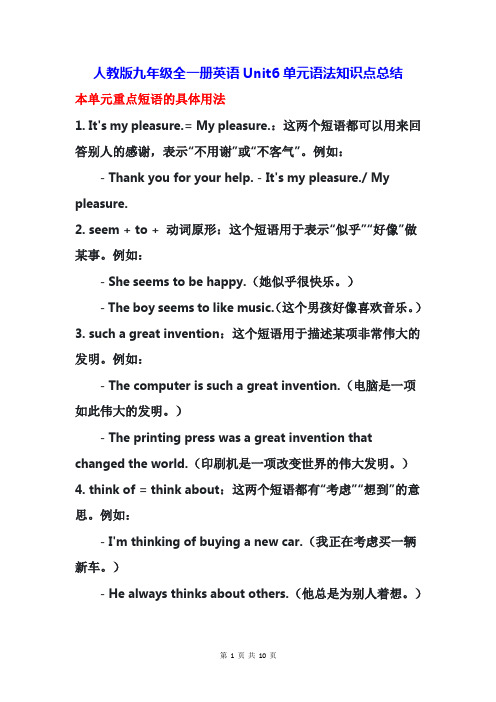
人教版九年级全一册英语Unit6单元语法知识点总结本单元重点短语的具体用法1. It's my pleasure.= My pleasure.:这两个短语都可以用来回答别人的感谢,表示“不用谢”或“不客气”。
例如:- Thank you for your help. - It's my pleasure./ My pleasure.2. seem + to + 动词原形:这个短语用于表示“似乎”“好像”做某事。
例如:- She seems to be happy.(她似乎很快乐。
)- The boy seems to like music.(这个男孩好像喜欢音乐。
)3. such a great invention:这个短语用于描述某项非常伟大的发明。
例如:- The computer is such a great invention.(电脑是一项如此伟大的发明。
)- The printing press was a great invention that changed the world.(印刷机是一项改变世界的伟大发明。
)4. think of = think about:这两个短语都有“考虑”“想到”的意思。
例如:- I'm thinking of buying a new car.(我正在考虑买一辆新车。
)- He always thinks about others.(他总是为别人着想。
)5. in our daily lives/ in my daily life:这两个短语用于描述在日常生活中的情况或活动。
例如:- Technology plays an important role in our daily lives.(科技在我们的日常生活中起着重要的作用。
)- In my daily life, I like to read books and exercise.(在我的日常生活中,我喜欢读书和锻炼。
初中英语 Unit6用法汇总+词法句法语法总结及练习人教版九年级全一册
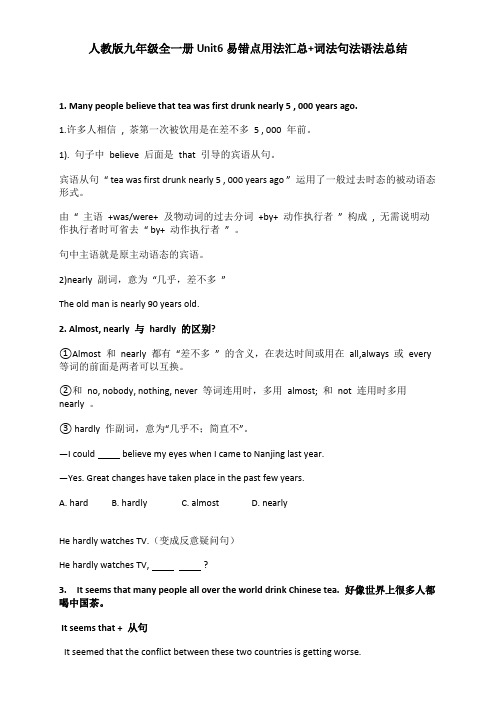
人教版九年级全一册Unit6易错点用法汇总+词法句法语法总结1. Many people believe that tea was first drunk nearly 5 , 000 years ago.1.许多人相信, 茶第一次被饮用是在差不多5 , 000 年前。
1). 句子中believe 后面是that 引导的宾语从句。
宾语从句“ tea was first drunk nearly 5 , 000 years ago ” 运用了一般过去时态的被动语态形式。
由“ 主语+was/were+ 及物动词的过去分词+by+ 动作执行者” 构成, 无需说明动作执行者时可省去“ by+ 动作执行者” 。
句中主语就是原主动语态的宾语。
2)nearly 副词,意为“几乎,差不多”The old man is nearly 90 years old.2. Almost, nearly 与hardly 的区别?①Almost 和nearly 都有“差不多” 的含义,在表达时间或用在all,always 或every 等词的前面是两者可以互换。
②和no, nobody, nothing, never 等词连用时,多用almost; 和not 连用时多用nearly 。
③ hardly 作副词,意为“几乎不;简直不”。
—I could believe my eyes when I came to Nanjing last year.—Yes. Great changes have taken place in the past few years.A. hardB. hardlyC. almostD. nearlyHe hardly watches TV.(变成反意疑问句)He hardly watches TV, ?3. It seems that many people all over the world drink Chinese tea. 好像世界上很多人都喝中国茶。
Unit6重点知识人教版九年级英语全册
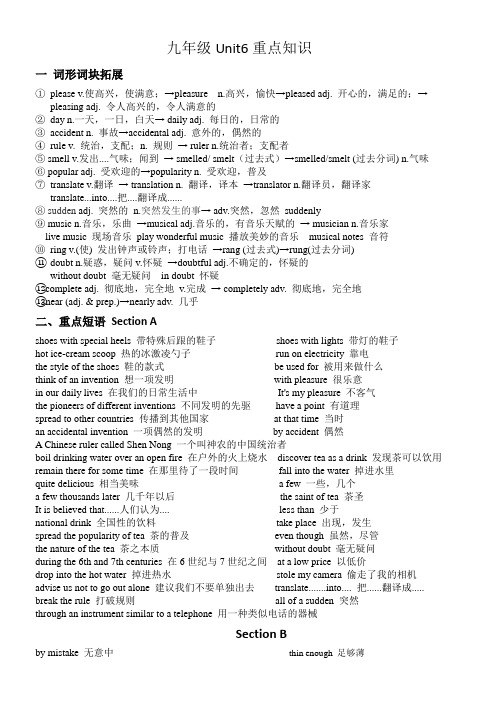
九年级Unit6重点知识一词形词块拓展①please v.使高兴,使满意;→pleasure n.高兴,愉快→pleased adj. 开心的,满足的;→pleasing adj. 令人高兴的,令人满意的②day n.一天,一日,白天→ daily adj. 每日的,日常的③accident n. 事故→accidental adj. 意外的,偶然的④rule v. 统治,支配;n. 规则→ ruler n.统治者;支配者⑤ smell v.发出....气味;闻到→ smelled/ smelt(过去式)→smelled/smelt (过去分词) n.气味⑥ popular adj. 受欢迎的→popularity n. 受欢迎,普及⑦translate v.翻译→ translation n. 翻译,译本→translator n.翻译员,翻译家translate...into....把....翻译成......⑧sudden adj. 突然的n.突然发生的事→ adv.突然,忽然suddenly⑨ music n.音乐,乐曲→musical adj.音乐的,有音乐天赋的→ musician n.音乐家live music 现场音乐play wonderful music 播放美妙的音乐musical notes 音符⑩ring v.(使) 发出钟声或铃声;打电话→rang (过去式)→rung(过去分词)⑪doubt n.疑惑,疑问v.怀疑→doubtful adj.不确定的,怀疑的without doubt 毫无疑问in doubt 怀疑⑫complete adj. 彻底地,完全地v.完成→ completely adv. 彻底地,完全地⑬ near (adj. & prep.)→nearly adv. 几乎二、重点短语Section Ashoes with special heels 带特殊后跟的鞋子shoes with lights 带灯的鞋子hot ice-cream scoop 热的冰激凌勺子run on electricity 靠电the style of the shoes 鞋的款式be used for 被用来做什么think of an invention 想一项发明with pleasure 很乐意in our daily lives 在我们的日常生活中It's my pleasure 不客气the pioneers of different inventions 不同发明的先驱have a point 有道理spread to other countries 传播到其他国家at that time 当时an accidental invention 一项偶然的发明by accident 偶然A Chinese ruler called Shen Nong 一个叫神农的中国统治者boil drinking water over an open fire 在户外的火上烧水discover tea as a drink 发现茶可以饮用remain there for some time 在那里待了一段时间fall into the water 掉进水里quite delicious 相当美味 a few 一些,几个a few thousands later 几千年以后the saint of tea 茶圣It is believed that......人们认为.... less than 少于national drink 全国性的饮料take place 出现,发生spread the popularity of tea 茶的普及even though 虽然,尽管the nature of the tea 茶之本质without doubt 毫无疑问during the 6th and 7th centuries 在6世纪与7世纪之间at a low price 以低价drop into the hot water 掉进热水stole my camera 偷走了我的相机advise us not to go out alone 建议我们不要单独出去translate.......into.... 把......翻译成..... break the rule 打破规则all of a sudden 突然through an instrument similar to a telephone 用一种类似电话的器械Section Bby mistake 无意中thin enough 足够薄make the customer happy 使客户高兴in the end最后become an event at the Olympics 它成了奥运会的一个比赛项目for a long time很长时间play inside on a hard floor 在室内坚硬的地板上玩儿be born 出生devide.....into.....把....分成..... at the same time 同时stop sb. from doing sth. 阻止某人做某事the number of..........的数量stop the competing team from getting the ball into their own basket阻止竞争对手把球投进他们自己的篮筐里dream of becoming famous players 梦想成为著名的篮球运动员look up to仰慕encourage sb.to do sth.鼓励某人做某事in the hallway在走廊里encourage young people to work hard to achieve their dreams.鼓励年轻人努力工作来实现他们的梦想the professional basketball groups 职业篮球队come up with 想出It's hard to do sth. 很难做某事三.知识点① We never know what will ________ in the future, and the thing we can do is to enjoy the present.② Great changes have ___________ in China in recent years. People are becoming richer and richer.① It is ________ that there will be a good harvest.②It’s________ to all that playing too much computer games is bad for our health.③It’s________ that the poor children in the countryside have gotten much help from the kind people, and they can go to school again.② I’ll go there ____________in August.③ I have been to Beijing ______________.四.重点句子①It is said that a Chinese ruler called Shen Nong was the first to discover tea as a drink.据说一位叫做神农的中国统治者最早发现了茶可以饮用。
九年级英语人教版全册Unit6_重点词句总结
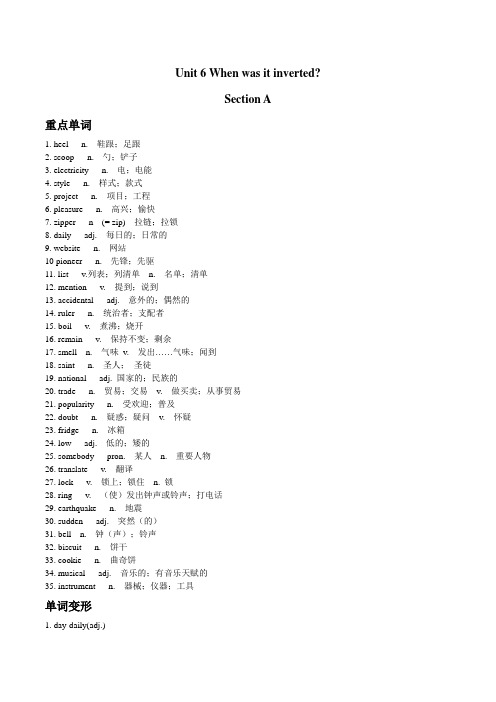
Unit 6 When was it inverted?Section A重点单词1. heel n. 鞋跟;足跟2. scoop n. 勺;铲子3. electricity n. 电;电能4. style n. 样式;款式5. project n. 项目;工程6. pleasure n. 高兴;愉快7. zipper n (= zip) 拉链;拉锁8. daily adj. 每日的;日常的9. website n. 网站10 pioneer n. 先锋;先驱11. list v.列表;列清单n. 名单;清单12. mention v. 提到;说到13. accidental adj. 意外的;偶然的14. ruler n. 统治者;支配者15. boil v. 煮沸;烧开16. remain v. 保持不变;剩余17. smell n. 气味v. 发出……气味;闻到18. saint n. 圣人;圣徒19. national adj. 国家的;民族的20. trade n. 贸易;交易v. 做买卖;从事贸易21. popularity n. 受欢迎;普及22. doubt n. 疑惑;疑问v. 怀疑23. fridge n. 冰箱24. low adj. 低的;矮的25. somebody pron. 某人n. 重要人物26. translate v. 翻译27. lock v. 锁上;锁住n. 锁28. ring v. (使)发出钟声或铃声;打电话29. earthquake n. 地震30. sudden adj. 突然(的)31. bell n. 钟(声);铃声32. biscuit n. 饼干33. cookie n. 曲奇饼34. musical adj. 音乐的;有音乐天赋的35. instrument n. 器械;仪器;工具单词变形1. day-daily(adj.)2. please-pleasure(n.)3. invent-invention (n.发明物) –inventor(n. 发明家)4. music-musical (adj.)5. translate-translation (n. 翻译)-translator重点短语1. be invented (by sb.) 被(某人)发明2. the style of… ……的样式3. seem to do sth. / seem that… 似乎……4. by accident 偶然;意外地5. have a point 有道理6. fall / drop into 掉……里,落入,陷入7. the saint of tea 茶圣8. be brought to sp. 被带到某地9. take place 发生;出现10. without doubt 毫无疑问;的确11. at a low price 以很低的价格12. advise sb. to do sth. 建议某人做某事13. translate… into… 把……翻译成……14. all of a sudden 突然;猛地15. be similar to…和……相似重点句型1.“电话是什么时候被发明的”“我想它是在1876年被发明的。
- 1、下载文档前请自行甄别文档内容的完整性,平台不提供额外的编辑、内容补充、找答案等附加服务。
- 2、"仅部分预览"的文档,不可在线预览部分如存在完整性等问题,可反馈申请退款(可完整预览的文档不适用该条件!)。
- 3、如文档侵犯您的权益,请联系客服反馈,我们会尽快为您处理(人工客服工作时间:9:00-18:30)。
人教版九年级全一册英语Unit6重点语法知识点总结
Unit 6 When was it invented?
Section A(1a~2d)
_必记单词ⅢⅢ
1. heel n.鞋跟;足跟
【例句】His heel is raw because his shoe does not fit well. 因鞋子不合适,他的脚后跟擦破皮了。
2. scoop n. 勺;铲子
【例句】He used a scoop to scrve the ice cream. 他用铲子来吃冰激凌。
3. electricity n.电;电能
【例句】While I was cooking supper, the electricity went off.我正在做晚饭时停电了。
【联想】electrical adj.电的,与电有关的
4. style n.样式;款式
【例句】The style of this skirt is just in season.这条裙子的款式正当时令。
【搭配】out of style 过时的|| in style 流行;时髦地
5. project n.项目;工程
【例句】The project is proceeding as planned. 工程正在按计划进行。
【联想】projection n.设计;规划;放映
6. pleasure n.高兴;愉快
【例句】He didn't show any pleasure when I offered to go withhim.我提出和他一起去,他并没有表示出高兴的样子。
【搭配】pleasure in... 以……为荣‖with pleasure 乐意效劳It's a /my pleasure.不客气。
【注意】pleasure 多用作不可数名词,当做“快乐的事,乐事”解时用作可数名词。
7. zipper n.(=zip) 拉链;拉
【例句】The zipper is red.这条拉链是红色的。
8. daily adj.每日的;日常的
【例句】He writes for the daily newspaper.他为那家日报撰稿。
【搭配】daily life 日常生活
9. website n.网站
【词根记忆】web(网络)+site(站,点)→website
【例句】You can visit its website on the Internet.你可以访问它的网站。
10. pioneer n.先锋;先驱
【例句】I see everybody as a pioneer there.我认为每个人在那里都是先锋。
ll. list v.列表;列清单n.名单;清单
【例句】He wrote down his name on the list.他将他的名字写在清单上。
【搭配】make/draw a list 列清单
12. mention v.提到;说到
【例句】He didn't mention his illness in the letter.
在信中他没有提到他的疾病。
_常考短语_
1. have a point 有道理
【例句】You have a point there.(=I agree with your idea.)
我赞同你的看法。
2. the style of……的样式
3. daily life 日常生活
4. be invented(by sb. ) 被(某人)发明
_经典句型||||||_
an invention? 你能帮我想个发明吗?
Can you...?意为“你能……吗?”,其后接动词原形。
此句型表示客气地请求某人做某事,其肯定回答一般为Sure, I'd love/liketo./With pleasure.等。
否定回答中常用 Sorry.代替 No.以示礼貌,即“Sorry, I can't...”或“I'm sorry, but...”。
